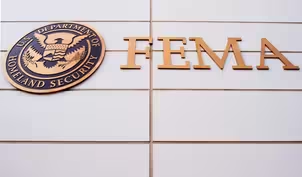
Cracker Barrel backlash reveals the power of branding
Clip: 8/27/2025 | 5m 44sVideo has Closed Captions
What the Cracker Barrel backlash reveals about the power of branding
Cracker Barrel is backtracking on its nearly $700 million rebrand after widespread backlash from customers and investors. The overhaul, centered on a text-only logo and a modern design, was criticized as sterile and out of step with the chain’s nostalgic image. Geoff Bennett discussed the rebrand, the backlash and the politics at play with Americus Reed, marketing professor at the Wharton School.
Problems playing video? | Closed Captioning Feedback
Problems playing video? | Closed Captioning Feedback
Major corporate funding for the PBS News Hour is provided by BDO, BNSF, Consumer Cellular, American Cruise Lines, and Raymond James. Funding for the PBS NewsHour Weekend is provided by...

Cracker Barrel backlash reveals the power of branding
Clip: 8/27/2025 | 5m 44sVideo has Closed Captions
Cracker Barrel is backtracking on its nearly $700 million rebrand after widespread backlash from customers and investors. The overhaul, centered on a text-only logo and a modern design, was criticized as sterile and out of step with the chain’s nostalgic image. Geoff Bennett discussed the rebrand, the backlash and the politics at play with Americus Reed, marketing professor at the Wharton School.
Problems playing video? | Closed Captioning Feedback
How to Watch PBS News Hour
PBS News Hour is available to stream on pbs.org and the free PBS App, available on iPhone, Apple TV, Android TV, Android smartphones, Amazon Fire TV, Amazon Fire Tablet, Roku, Samsung Smart TV, and Vizio.
Providing Support for PBS.org
Learn Moreabout PBS online sponsorshipGEOFF BENNETT: Cracker Barrel is backtracking on its costly nearly $700 million rebrand after widespread backlash from customers and investors.
The overhaul centered on a controversial text-only logo and a minimalist modern design was criticized as sterile and out of step with the chain's nostalgic image.
Following a steep drop in stock value and pressure from an activist investor, as well as from President Trump, who called for the company to go back to the old look, Cracker Barrel reinstated its classic Uncle Herschel logo.
For more on the implications of the rebrand and the backlash and the politics at play, we're joined now by Americus Reed, marketing professor at The Wharton School of the University of Pennsylvania.
It's great to have you here.
AMERICUS REED, The Wharton School, University of Pennsylvania: It's great to be here.
GEOFF BENNETT: So this Cracker Barrel rebrand was met with near-universal criticism and backlash.
Was this simply a design misstep or a deeper failure to understand how people connect with that brand?
AMERICUS REED: Well, the answer is actually both.
One would think that just changing a picture is not that big of a deal, but it turns out that, with brands, that the logo, the colors, the imagery, the graphics, over time, they take on more than just the meaning that is associated with their aesthetic.
In other words, Uncle Herschel is not just the picture of an elderly man leaning against a barrel, and the barrel is not just a barrel.
It is a symbol of a lifestyle.
In other words, when you walk into that store, there's a feeling that you get, right?
It's an old country store.
There are antiques.
There are rocking chairs.
There's apple pie and fantastic pancakes.
And so when you walk in there, the entire experience is subsumed by all of the imagery that goes into what the brand is, the meaning system that the brand stands for.
And as a loyal customer who maybe has been going to Cracker Barrels for years, you have that feeling that it connects with who you are.
You affiliate with it because it has social utility to you.
And so, when Uncle Herschel disappears, you have in your mind perhaps the idea that the values, the beliefs, the ideologies, all of that stuff that goes along with Cracker Barrel might be disappearing too.
And that's very, very psychologically troubling for some consumers, because they feel then that, if you are now - - my self-concept is infused in this idea, and now you're changing, so you're trying to change me, and I don't want to change.
GEOFF BENNETT: And, as you point out, Cracker Barrel built its entire identity around a very specific slice of Americana.
Are there any legacy brands that got it right, that got their rebrands right?
AMERICUS REED: Yes, there are quite a few legacy brands that got it right.
And, by the way, logo changes are happening all the time.
And the reason we don't talk about it is because they're typically doing it right.
So, when you think about -- I will give you an example.
The Notre Dame mascot just changed recently, a slight change.
Again, the idea here is that you change little by little, right?
And so the notion that you change in terms of making a small change, like, for example, when Starbucks changed, did a very small kind of initial thing that sort of changed some of the graphic elements, staying under the just noticeable difference, and things like that.
So when a company tries to change and do it the right way, they're going to try to do it slowly.
And so most companies understand that that symbol has a lot of power and that they have spent a lot of time and money creating the meaning system that consumers believe that particular brand product, logo, et cetera, stands for.
GEOFF BENNETT: So I got to ask, where do you come down?
Were you a fan of the original Cracker Barrel logo or the revised one?
AMERICUS REED: I'm a fan of the original, because, as they say if it ain't woke, don't fix it.
(LAUGHTER) AMERICUS REED: I mean, you make a very interesting point here, because, I mean, in some senses, this whole entire idea of the fact that there is a big group of consumers who are out there that just have nostalgia and affect and memories growing up and being in that store.
So, changing, suddenly bringing in brand-new light fixtures and making the walls white and taking away the antique trinkets and things like that, that's very detrimental to them.
Then you have political activists who said, hey, here's an opportunity to continue the story of brands that are bowing down to these progressive, liberal ideas.
And so they saw an opportunity to jump in and ride that wave and join the group of people who are upset for more, let's say, nostalgic and/or sentimental reasons to create an even bigger wave of folks that were upset about this situation.
And, by the way, it's super interesting, the point that a restaurant can become tied to political ideology.
There's a very famous study that was done that basically showed that there are higher concentrations of Cracker Barrels in red state districts and there are higher concentrations of, for example, Whole Foods in blue state districts.
So just how you geographically cluster your company can create a kind of connection to certain values, whether they be conservative or liberal or otherwise.
And you have to pay attention to that becoming part of your story, because it leaves you open to this idea that, if you change something, there's going to be not just a change that is a superficial change, but a psychological change that very many consumers may actually respond to, and they may respond to it in a very negative way.
GEOFF BENNETT: Americus Reed, marketing professor at the Wharton School, great to speak with you.
Thanks for joining us.
AMERICUS REED: I really appreciate the opportunity, Geoff.
Thank you.
FEMA employees critical of Trump placed on leave
Video has Closed Captions
Clip: 8/27/2025 | 6m 37s | FEMA employees critical of Trump placed on leave amid crackdown on dissent (6m 37s)
Minneapolis mayor calls for action after school attack
Video has Closed Captions
Clip: 8/27/2025 | 11m 16s | 'We owe this to our children': Minneapolis mayor calls for action after school attack (11m 16s)
News Wrap: Feds taking control of D.C.'s Union Station
Video has Closed Captions
Clip: 8/27/2025 | 7m 14s | News Wrap: Trump administration taking over management of D.C.'s Union Station (7m 14s)
Russia, Ukraine target energy infrastructure as war persists
Video has Closed Captions
Clip: 8/27/2025 | 4m 7s | Russia and Ukraine target each other's energy infrastructure as war persists (4m 7s)
'Wake up,' Miles Taylor warns as Trump punishes opponents
Video has Closed Captions
Clip: 8/27/2025 | 6m 16s | Miles Taylor warns: 'We need America to wake up' as Trump punishes opponents (6m 16s)
What Americans can learn from Northern Ireland's history
Video has Closed Captions
Clip: 8/27/2025 | 11m 31s | What Americans can learn from Northern Ireland's history of political violence (11m 31s)
Providing Support for PBS.org
Learn Moreabout PBS online sponsorshipSupport for PBS provided by:
Major corporate funding for the PBS News Hour is provided by BDO, BNSF, Consumer Cellular, American Cruise Lines, and Raymond James. Funding for the PBS NewsHour Weekend is provided by...

















